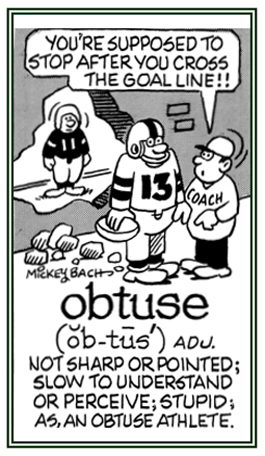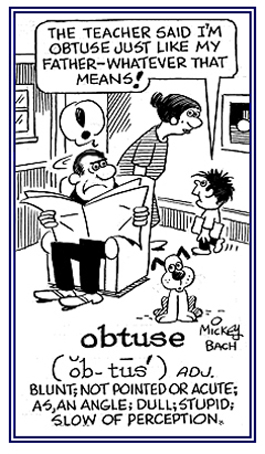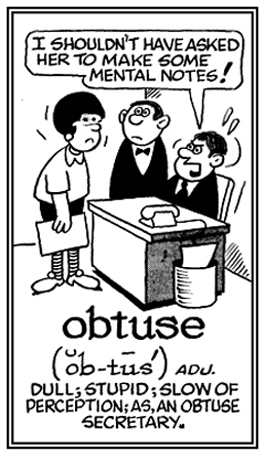obtusi- +
(Latin: to blunt, dull; from ob- "against" plus tundere, "to beat, strike")
blunt (s) (noun), blunts
Something that is less sharp: The reporters tried to be careful with their criticism by praising Mary's energy and enthusiasm; this way, their blunts were not so upsetting.
bluntness
The quality of being overly direct and outspoken: "She replied with characteristic bluntness."
obtuse (adjective), more obtuse, most obtuse
1. Slow to understand or to perceive something; lacking fast perception or intellect: The politician appeared more obtuse than she really was when she asked nonsensical questions at the debate with her opponent.
2. In mathematics, an angle greater than 90 degrees and less than 180 degrees: Jeff's geometry teacher required him to learn to calculate and to draw an obtuse angle before he could pass his test.
3. Blunt, not sharp or pointed: The forester used an obtuse knife to carve into the stump the date the tree was cut down.
4. A description of tree leaves that have rounded or have blunt tips: Cleo noticed that maple trees do not have obtuse leaves.
5. Etymology: from Middle French obtus, obtuse, from Latin obtusus, "blunted, dull"; from obtundere, "to beat against, to make dull"; from ob, "against" + tundere, "to beat".

© ALL rights are reserved.

© ALL rights are reserved.

© ALL rights are reserved.
Go to this Word A Day Revisited Index
2. In mathematics, an angle greater than 90 degrees and less than 180 degrees: Jeff's geometry teacher required him to learn to calculate and to draw an obtuse angle before he could pass his test.
3. Blunt, not sharp or pointed: The forester used an obtuse knife to carve into the stump the date the tree was cut down.
4. A description of tree leaves that have rounded or have blunt tips: Cleo noticed that maple trees do not have obtuse leaves.
5. Etymology: from Middle French obtus, obtuse, from Latin obtusus, "blunted, dull"; from obtundere, "to beat against, to make dull"; from ob, "against" + tundere, "to beat".



Go to this Word A Day Revisited Index
so you can see more Mickey Bach illustrations.
obtuseness
1. A reference to a lack of a sharp edge or point.
2. The quality of being slow to understand.
3. Characterized by a lack of intelligence or sensitivity; such as, an obtuse remark.
4. Not distinctly felt; for example, an obtuse pain.
2. The quality of being slow to understand.
3. Characterized by a lack of intelligence or sensitivity; such as, an obtuse remark.
4. Not distinctly felt; for example, an obtuse pain.
obtusilingual
Short- and blunt-tongued.
obtusion
1. The act or process of making obtuse or blunt.
2. The state of being dulled or blunted; such as, the obtusion of the senses and perceptions.
3. A state of diminished sensibility or consciousness.
2. The state of being dulled or blunted; such as, the obtusion of the senses and perceptions.
3. A state of diminished sensibility or consciousness.
<img src="/img/left_arrow_sm.gif" alt="" /> <img src="/img/right_arrow_sm.gif" alt="" />
Showing 1 page of 6 main-word entries or main-word-entry groups.
